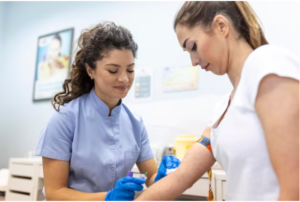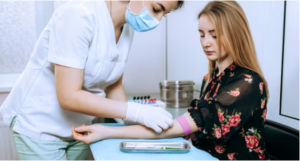The Ultimate Guide to Phlebotomy Certification Programs in London
Introduction
Embarking on a career in healthcare can be a daunting yet rewarding journey. As the healthcare industry continues to grow, roles like phlebotomists are becoming increasingly essential. The ability to draw blood safely and effectively is a skill set that hospitals, clinics, and diagnostic laboratories require on a daily basis. Choosing the right phlebotomy certification program is the first step towards a successful and fulfilling career in this field. If you’re considering a phlebotomy certification program in London, you’re in the right place. In this comprehensive guide, we’ll walk you through everything you need to know about phlebotomy, the certification process, and where to find the best programs in the city.
Understanding Phlebotomy: What Is It and Why Is It Important?
Phlebotomy is the process of puncturing a vein to draw blood for testing, donations, transfusions, or research. This role is crucial in healthcare settings as blood samples provide vital information for diagnosing illnesses and monitoring treatments. A skilled phlebotomist not only ensures the integrity of the blood sample but also delivers a positive patient experience. As the healthcare system evolves, phlebotomists are increasingly required to be versatile and capable of using various venipuncture techniques. Check out this Phlebotomy certification program in London.
The Importance of Certification
While phlebotomy can sometimes be learned on the job, formal certification offers numerous benefits. It provides you with the necessary knowledge about blood collection and handling procedures, along with patient safety and quality assurance. A certified phlebotomist often has better job prospects, as certification is frequently a requirement by employers. Furthermore, a certified phlebotomist can typically command a higher salary.
Prerequisites for Enrolling in a Phlebotomy Certification Program
Before you enroll in a phlebotomy certification program, there are a few prerequisites you should be aware of. Some may also require you to have a background in biology or healthcare, while others will accept students with no prior experience.
What to Look for in a Phlebotomy Certification Program
When searching for the right phlebotomy certification program, it’s important to consider several key factors:
- Accreditation: Look for programs that are accredited by reputable organizations such as the National Accrediting Agency for Clinical Laboratory Sciences (NAACLS) or the Commission on Accreditation of Allied Health Education Programs (CAAHEP).
- Curriculum: The program should cover a range of topics, including phlebotomy techniques, medical terminology, anatomy and physiology, infection control, and patient care.
- Hands-on Experience: Practical training in a clinical setting is essential for developing your skills and confidence.
- Exam Preparation: The program should prepare you for the phlebotomy certification exam, which is usually administered by a professional body such as the National Phlebotomy Association (NPA) or the American Society for Clinical Pathology (ASCP).
- Job Placement Assistance: Programs that offer job placement support can help you transition from certification to employment more smoothly.

T
How Long Does It Take to Complete a Phlebotomy Certification Program?
The duration of a phlebotomy certification program can vary, but most can be completed in as little as four to eight months. Some programs offer part-time options for individuals who need a more flexible schedule.
What Does a Phlebotomy Certification Program Cover?
The curriculum of a phlebotomy certification program will cover a wide array of subjects. Here are some of the core areas you can expect to study:
- Anatomy and Physiology: A thorough understanding of the circulatory system is essential for successful venipuncture.
- Blood Collection Techniques: You will learn various methods of drawing blood, such as venipuncture, capillary puncture, and arterial puncture.
- Infection Control: Safe practices for preventing the spread of infection are paramount in phlebotomy.
- Patient Care: Effective communication, patient comfort, and ethical considerations are integral to the role of a phlebotomist.
- Legal and Ethical Issues: You will become familiar with the laws and regulations that govern blood collection and healthcare in general.
How Much Does a Phlebotomy Certification Program Cost?
The cost of a phlebotomy certification program can vary widely. Public institutions and community colleges generally offer more affordable options than private schools. Additionally, you should factor in the cost of study materials and the certification exam when budgeting for your education.
Where to Find Phlebotomy Certification Programs in London
London is home to a range of educational institutions that offer phlebotomy certification programs. Here are a few options to consider:
- Hospitals and Clinics: Some healthcare facilities offer phlebotomy training programs that can lead to certification.
- Community Colleges: Community colleges often provide affordable and accessible phlebotomy certification programs.
- Online Programs: There are also online phlebotomy certification programs available for those who require flexibility.
The Certification Process
Once you have completed your phlebotomy certification program, you will need to take a certification exam. The specific exam you will take depends on the organization that granted your program’s accreditation. These exams typically include a written portion that tests your knowledge of phlebotomy procedures and an optional practical exam to demonstrate your venipuncture skills.
Maintaining Your Certification
Once you become a certified phlebotomist, you will need to maintain your certification by completing continuing education requirements. This may include taking additional courses, attending workshops, or participating in conferences.
Job Prospects and Salary Expectations
Phlebotomists are in high demand, and the job outlook for this field is very positive. With a growing ageing population and advances in medical technology, the need for phlebotomists is expected to continue rising. In London, the average salary for a certified phlebotomist ranges from £20,000 to £30,000 per year, depending on experience and qualifications.

Conclusion
If you’re considering pursuing a phlebotomy certification program, research your options thoroughly, consider your goals, and choose a program that sets you up for success. With the right education and training, you’ll be on your way to becoming a certified phlebotomist, ready to make a difference in the lives of patients. For more guidance, reach out to specific programs you’re considering. Good luck on your journey to becoming a certified phlebotomist in London!
